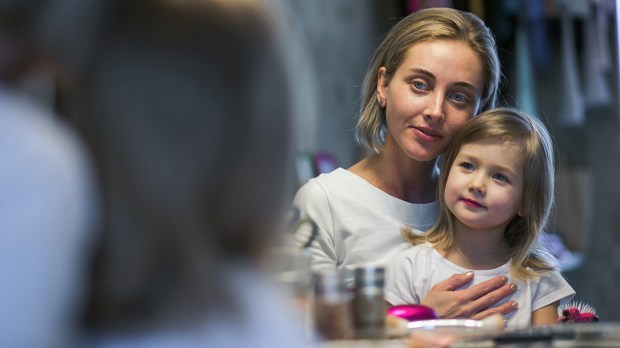A mirror hangs in my room. A large mirror, and heavy. A stiff claw of wiry cable protrudes from the back to mount it to the wall. It is the simplest design – a sheet of rectangular glass, each corner smoothed by a bronzed lily bloom, which as a child I thought (to my mother’s chagrin) were bronzed banana peels.
As a little girl, I saw my mother see herself in this mirror. She in turn had watched her mother 60 years before that, and before that, my grandmother watched her own mother comb her hair and smooth her skirt in the same thick glass.
My great-grandmother’s mirror is one of the only items I carry from my family of origin in this Marie Kondo age. We have a small house, five children, a dog, and an endless stream of activity; but this looking-glass has remained.
My three daughters now watch me in this mirror. The littlest is not tall enough to see in it, just tall enough to leave jammy fingerprints when she reaches up to touch it. But my five-year-old is tall enough to gasp wide-eyed at her pixie haircut when we first cut off her long hair; to imagine grown-up-ness when she sneaks in there alone and puts on lip gloss and dress-ups to match the stories she’s always telling in her head. She lives in a world where everything is beautiful, and everything is possible.
My nine-year-old daughter has changed a lot recently. Her cheekbones have sharpened, her limbs lengthened, and she carries herself with more grace. She, more than the others, is constantly told that she looks like her mama, though really, she looks like herself. Our dark hair is exactly the same shade though, and her quietude matches mine. Her looks in the mirror are few, but more curious, experimental – she washes her face there before school, and tries a new way with her hair.
I stood there last Sunday, readying for Mass. I was lost in my own world — a genetic trait I passed down to my five-year-old, though her world is happier. It was she who sneaked in during this reverie and slipped her long fingers in mine.
“Mama. What’s wrong?”
As her words reached me, I regained focus and staring straight ahead, saw what she saw, briefly – my face in the mirror.
I saw the furrow, the frown, the displeased squint at my stomach — perpetually rounded after the years of carrying my children. I saw my chest raised in an unspoken sigh of discontent.I saw all this in split-second, before I turned to her open brown eyes, her small curved lips, the questioning tilt of her head. What’s wrong?
Unbidden, a memory of my mother came toward me – starched blouse, ironed jeans, wool sweater; her trademark green eyeliner and wine lipstick. She who was always petite, slim, and classy, in this memory had on her own “mirror face” — lip bit slightly, shoulders held back, critique in her eye, turning away with a shrug.
I sat on the edge of my bed and my daughter tucked herself into me. I held her as I raced to find an answer. She spoke first. “You look beautiful, mama.”
I have not been able to get this moment out of my mind.
I have no savings accounts or retirement plans to leave as a legacy to my daughters. The only legacy I hope to leave them is one of love. And that includes loving themselves as the Father does.
That love is not a passive thing, a birthday card sent once a year signed, “love you – Dad.” No, it is from one who is right now within us, overcome with delight:
The Lord your God is in your midst … he will rejoice over you with gladness, he will quiet you by his love, he will exult over you with loud singing. (Zeph 3:17)
“In our midst” — in our scars, our screw-ups, our grim countenances weathered from the stresses of life.
I will never let my daughter find me as she did that day. Whatever poor example I may be in other ways, I will not model for her inadequacy and disappointment.
As foreign as it feels, I am inviting God in to love me in my thinning skin, in my squishy belly, in my unwarranted anxieties. I’m trying to look at my face, with teeth that need a trip to the dentist, and eyes that don’t tolerate contacts so well anymore, and see someone delighted in.
I’m not going to be good at this. But I’m not going to try to do it all myself either. He is already doing it — He already has been doing it.
All I am doing is giving a timid yes to this love. When my grown daughters take their turn at the mirror, I hope what they find is that yes reflected back to them.

Read more:
Here’s what a mother wants her daughter to know as she leaves the nest

Read more:
The reason the mother-daughter bond is the strongest of all

